

Real estate investment is a time-honored strategy for building wealth and generating steady income, typically involving the purchase of homes, apartments, or commercial buildings, but it also offers diverse approaches beyond direct ownership. Investors can opt for real estate investment trusts (REITs), which provide exposure to property markets through shares in companies that own and manage real estate, making entry easier without the need for hands-on management. Others prefer to rent out residential properties for monthly cash flow, while some focus on flipping properties—buying, renovating, and selling them quickly for profit. The appeal of real estate lies in its potential for long-term appreciation, as property values generally rise over time, and its ability to serve as a hedge against inflation, since both property prices and rents tend to increase alongside living costs. Additionally, real estate ownership can offer valuable tax benefits, such as deductions for mortgage interest and property expenses. However, real estate investing is not without challenges: it often requires significant upfront capital for down payments, maintenance, and improvements, and managing properties can be time-consuming and unpredictable. Unexpected costs and difficult tenants can also arise. Success in real estate demands careful market research, choosing properties with strong potential, and understanding the risks, including market downturns and management issues. Despite these challenges, real estate remains a popular and rewarding way to build long-term wealth for those willing to invest the necessary time, effort, and resources.
Real Estate
Types of Real Estate
Residential Real Estate


Residential real estate refers to properties such as houses, apartments, and villas that are designed for people to live in. Investing in residential real estate is a popular strategy for either earning rental income or achieving personal homeownership. The value of residential properties is shaped by factors such as their location, proximity to local amenities like schools, hospitals, and transportation, and the overall demand for housing in the area. Because the need for housing is constant, residential real estate is widely regarded as a stable and reliable investment. Additionally, government programs—including mortgage tax deductions and affordable housing initiatives—further increase the attractiveness of residential real estate for both homeowners and investors.
Commercial Real Estate


Commercial real estate consists of properties like offices, retail spaces, hotels, and warehouses, which are generally leased to businesses and generate rental income for investors. This form of real estate is a favored investment choice because it often offers the possibility of higher returns compared to residential properties, particularly in locations with strong demand. The profitability and value of commercial properties are heavily influenced by factors such as location, foot traffic, infrastructure development, and broader economic growth. Investors benefit from long-term lease agreements with companies, which help ensure a steady and reliable cash flow. While commercial real estate provides robust income potential and portfolio diversification, it typically requires a larger initial investment and involves more complex management compared to residential real estate.
Industrial Real Estate
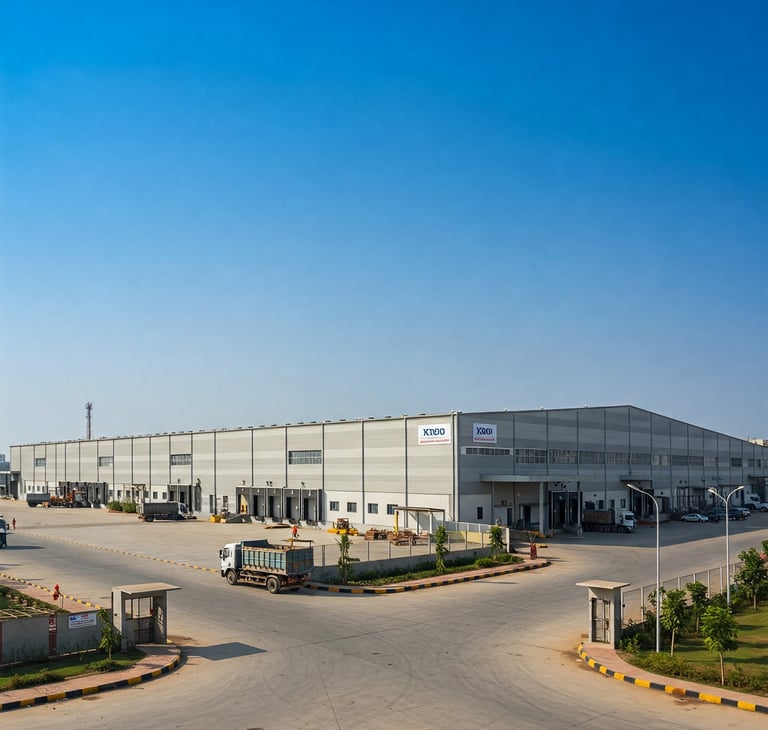

Industrial real estate includes properties such as factories, warehouses, and distribution centers that are essential for manufacturing, logistics, and storage within industries like manufacturing, e-commerce, and transportation. These properties are typically situated in designated industrial zones or near major transportation hubs, ensuring smooth and efficient business operations. The rapid growth of e-commerce and the expansion of global supply chains have significantly increased demand for industrial real estate, making it an attractive investment opportunity. Investors benefit from long-term leases and rising rental income driven by strong market demand. While managing industrial properties can be complex due to zoning and environmental regulations, industrial real estate nonetheless offers investors stable income streams, portfolio diversification, and the potential for value appreciation as the sector continues to grow.
Land


In real estate, land refers to undeveloped property that can be utilized for development, agriculture, or conservation. It is commonly viewed as a long-term investment due to its potential for value appreciation over time. Factors such as location, zoning laws, and the development of surrounding infrastructure play a crucial role in determining land value. Investors typically purchase land with the intention of reselling it at a profit or developing it into residential, commercial, or industrial properties. However, investing in land demands patience and careful strategic planning, as it may take several years before substantial returns are realized
Key Features of Real Estate
Long-Term Investment


Real estate is widely regarded as a popular long-term investment because it offers the potential for steady growth and appreciation over time. Unlike stocks or bonds, real estate often acts as a strong hedge against inflation, as property values and rental income tend to rise in tandem with increasing living costs. For long-term investors, rental income provides consistent cash flow, while the underlying property value generally increases over the years. Using mortgages to finance real estate purchases allows investors to leverage their investments, enabling control over larger assets with a smaller initial outlay. Although real estate is less liquid than many other investment options and requires patience, it tends to exhibit lower volatility over the long term and can yield substantial gains when properties are sold
Income Generation


Real estate is a highly flexible investment, offering investors various ways to generate income. A primary method is through rental income, where owners lease out residential or commercial properties to tenants for regular monthly payments. Another approach is property flipping, which involves purchasing properties at lower prices, making improvements, and selling them for a profit. For those seeking hands-off investment, real estate investment trusts (REITs) provide access to a diversified portfolio of income-generating properties managed by professionals, allowing investors to earn without direct involvement. Real estate crowdfunding platforms also enable individuals to pool funds and invest in large projects, sharing in the income or equity gains. Additionally, real estate investments often appreciate over time, delivering significant profits when properties are sold. This combination of income streams and long-term growth potential makes real estate an attractive and versatile investment choice.
Illiquidity


One of the defining features of real estate is its lack of liquidity, meaning it cannot be easily or quickly converted into cash. Selling a property involves a lengthy process—listing it on the market, locating a buyer, negotiating terms, and completing all necessary legal formalities—which can take several months or even over a year depending on the property’s location and current market conditions. On top of this, buying real estate requires substantial upfront expenses such as closing costs and agency fees, making it even less liquid. As a result, real estate is a less flexible investment option compared to other financial assets, and investors must be prepared to hold onto their properties for a longer period. Nevertheless, many investors are attracted to real estate because of its strong potential for long-term growth and the steady rental income it can provide, making it a compelling choice despite its relative illiquidity.
Location-Driven Value


Location is a critical factor in determining real estate value and is widely regarded as one of the most important indicators of property worth. Properties situated in well-connected and well-served areas—such as those near hospitals, schools, retail malls, and public transportation—tend to appreciate more rapidly and attract higher prices. Additional features like scenic views, proximity to parks, beaches, or commercial districts can further enhance property value. In urban centers, where demand is high and available land is limited, real estate prices often rise due to these competitive market conditions. Conversely, properties in areas with poor infrastructure, environmental issues, or safety concerns generally see lower values, as demand in these locations is typically reduced
Benefits of Investing in Real Estate
Steady Income
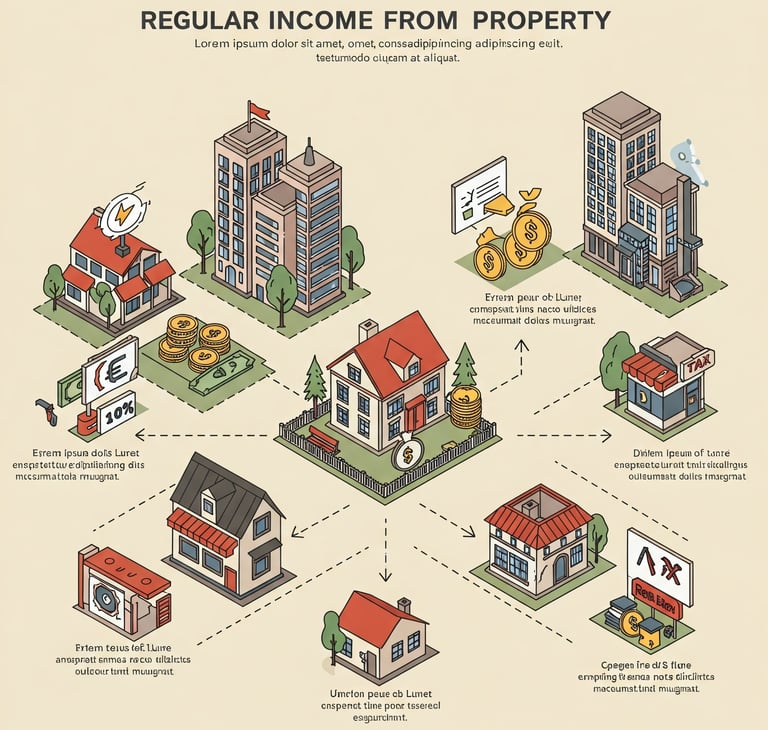

Real estate offers a reliable way to generate consistent income, particularly through rental properties. By owning property and renting it out, you can earn steady rental payments from tenants, with the potential for this income to grow over time as rental rates increase. Another effective method is investing in real estate investment trusts (REITs), which allow you to buy shares in companies that own and manage income-producing real estate. REITs distribute a portion of their profits to shareholders, providing a regular income stream without the need to manage properties directly. These approaches make real estate a versatile option for those seeking stable and potentially growing returns.
Capital Appreciation
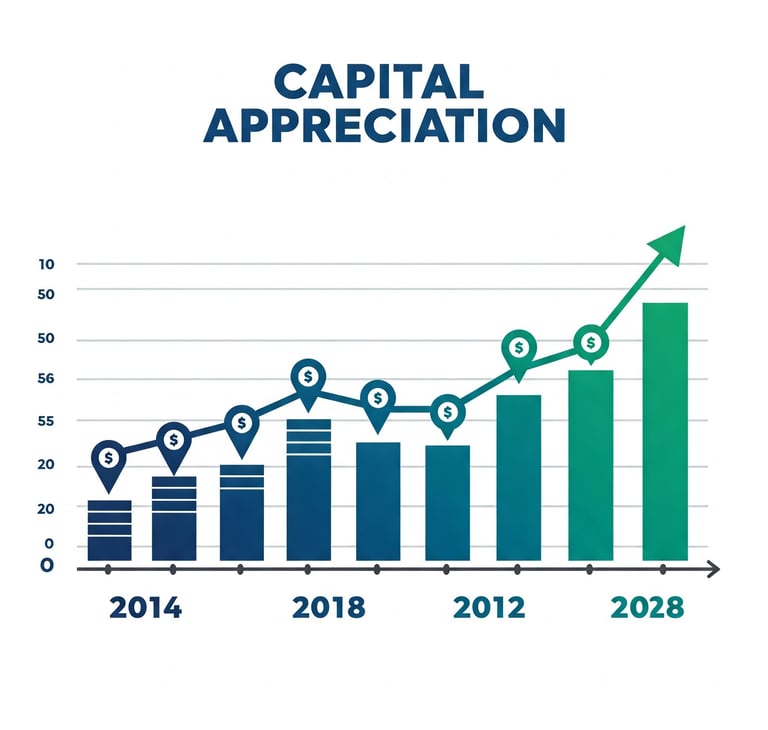

Capital appreciation in real estate refers to the steady increase in a property's value over time. This growth is influenced by factors such as the development of new infrastructure like roads and schools, rising demand for residential or commercial spaces in the area, and overall economic growth. As the local economy expands and prices rise, property values often follow suit—for example, a home bought for ₹50 lakh a decade ago might now be worth ₹1 crore. This potential for long-term value growth makes real estate an attractive investment for individuals seeking to build wealth over time
Diversification


Incorporating real estate into your investment portfolio can improve both its profitability and stability. Real estate, particularly rental properties, provides steady income and tends to respond differently to market changes compared to traditional assets like stocks and bonds. This diversification helps balance out market volatility, reducing overall risk. Since people always need places to live and work, real estate values often remain stable or even appreciate over time, making it a dependable option for long-term wealth growth. By spreading your investments across various asset classes, including real estate, you can distribute risk more effectively and maintain a more resilient portfolio, even during periods of economic uncertainty.
Tax Benefits


Purchasing real estate comes with several tax benefits that can help reduce your overall tax burden. If you own a rental property, you are allowed to deduct the interest paid on your mortgage from your taxable income, as well as claim deductions for property taxes. Another significant advantage is depreciation, which lets you deduct a portion of the property's value each year, even if the property's market value is increasing. These tax incentives make real estate an attractive investment option for those looking to minimize taxes while building wealth through property ownership
Hedge Against Inflation
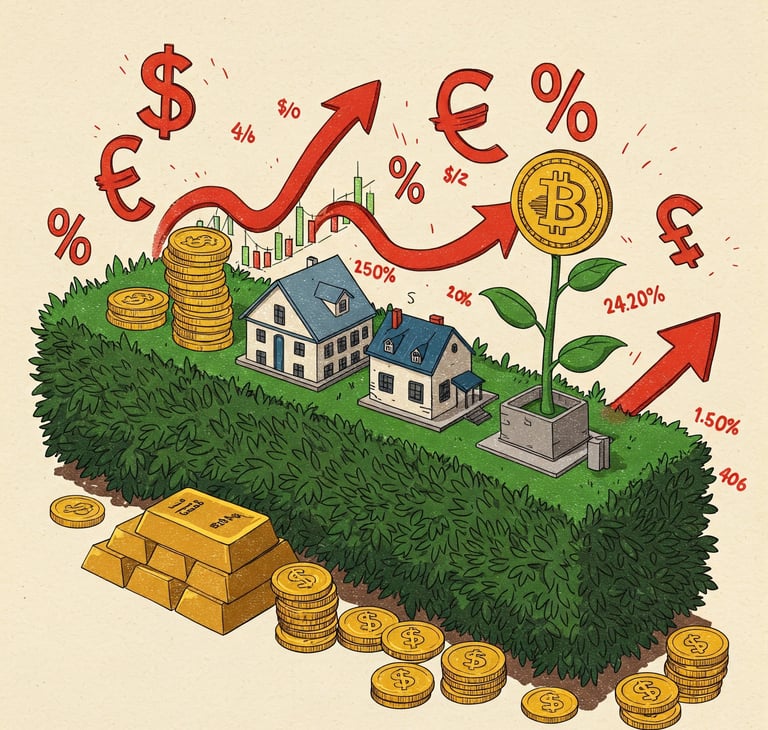

Investing in real estate is an effective strategy to shield your money from the effects of inflation. Inflation tends to increase the costs of labor and building materials, which in turn drives up property prices. This means real estate values often rise alongside inflation, helping to protect the purchasing power of your investment. Moreover, landlords can adjust rental rates to keep pace with the rising cost of living, ensuring that rental income remains consistent with inflation. This combination of property appreciation and inflation-linked rental income makes real estate a reliable option for preserving wealth, especially during times of economic uncertainty.
Challenges In Real Estate
High Initial Investment


Real estate is a capital-intensive investment that requires a significant financial commitment upfront. When purchasing property, buyers must account for expenses such as the down payment, registration fees, stamp duty, and legal charges. Many individuals also rely on home loans to finance their purchase, which adds to the overall cost through interest payments over time. This substantial initial outlay can be a barrier for first-time buyers or those with limited funds. Despite these high entry costs, real estate remains a popular investment choice due to its strong potential for long-term appreciation and the opportunity to earn rental income.
Market Volatility


Real estate values are influenced by various factors, including economic conditions, supply and demand dynamics, government regulations, and interest rates. Lower interest rates typically encourage buyer activity by making borrowing more affordable, which can drive property prices up, while economic slowdowns and higher interest rates often reduce demand and cause prices to fall. Additionally, government policies and infrastructure developments significantly impact property values by enhancing the desirability of certain locations. Although real estate generally experiences long-term growth, short-term volatility is common, especially in fluctuating markets or for investors aiming for quick profits. To navigate these risks effectively, having a strong understanding of market trends and maintaining a diversified investment portfolio are essential strategies for managing potential fluctuations and safeguarding investments.
Maintenance Costs
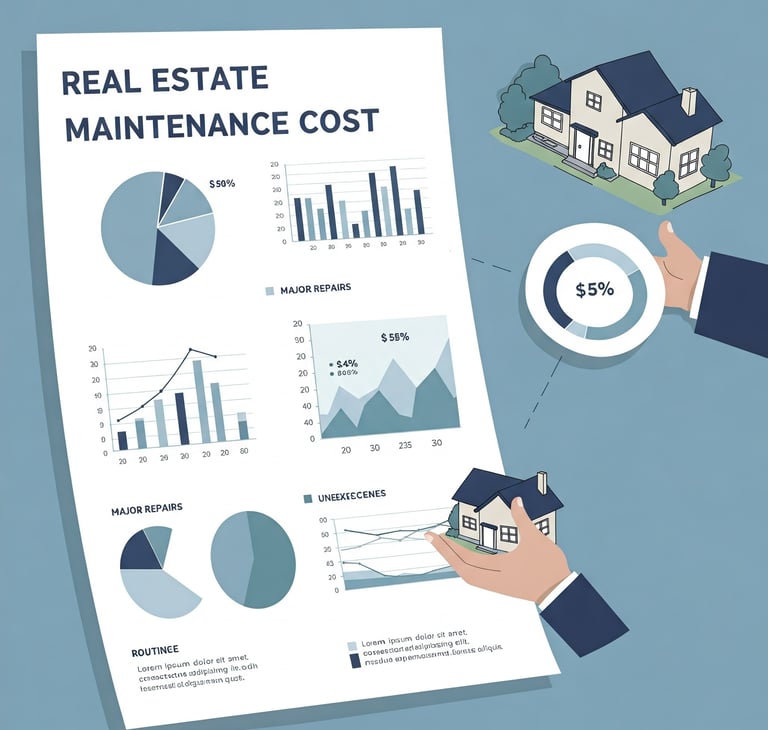

Maintenance costs are an essential part of real estate ownership, as they help preserve the property's condition and value. These expenses cover routine tasks such as cleaning, repairing damaged fixtures, and addressing electrical or plumbing issues. Properties located in areas with harsh weather or those that are older may require more frequent and costly repairs. Unexpected problems, like cracked walls or a leaking roof, can also lead to higher maintenance expenses. It is important for property owners, especially those who rent out their properties, to budget for these costs to keep their homes safe, functional, and attractive. Regular maintenance not only sustains the property's appeal but also helps prevent more expensive issues in the future, ensuring long-term value retention.
Regulatory Issues
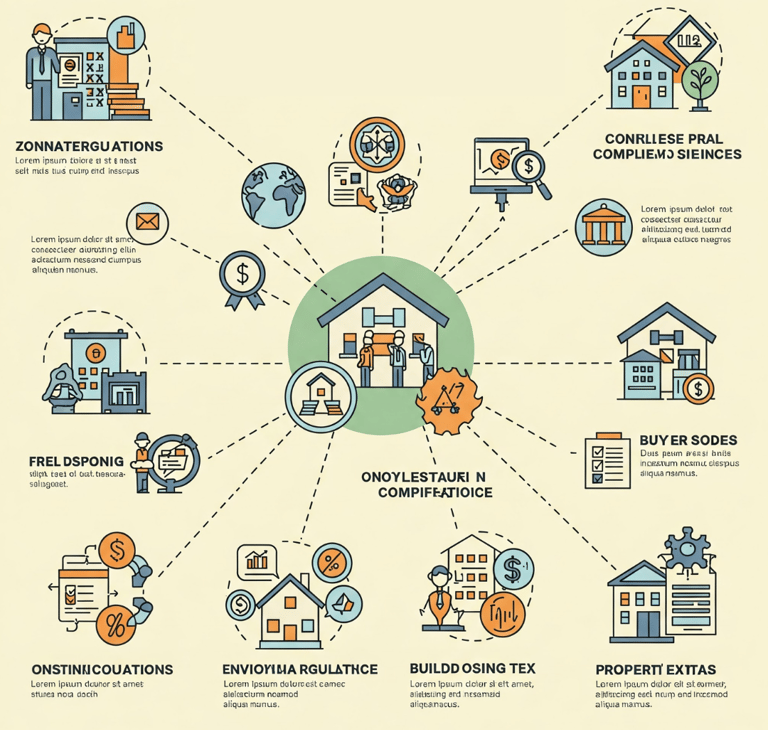

Real estate transactions can be complicated by a variety of rules and regulations. Zoning laws determine how land can be used—whether for residential, commercial, or industrial purposes—and violations can result in penalties or delays. Builders are also required to comply with environmental regulations, which aim to protect natural resources but can increase project costs. Taxes such as property tax and capital gains tax can affect the overall profitability of owning or selling property. Additionally, unclear land ownership records can lead to legal disputes or slow down transactions. In some areas, rent control laws limit how much landlords can charge tenants, while building safety regulations add further compliance requirements and expenses. Since these laws and regulations vary from one location to another, it is crucial for property owners and investors to carefully review local rules to avoid fines, legal issues, or unexpected delays.
Illiquidity
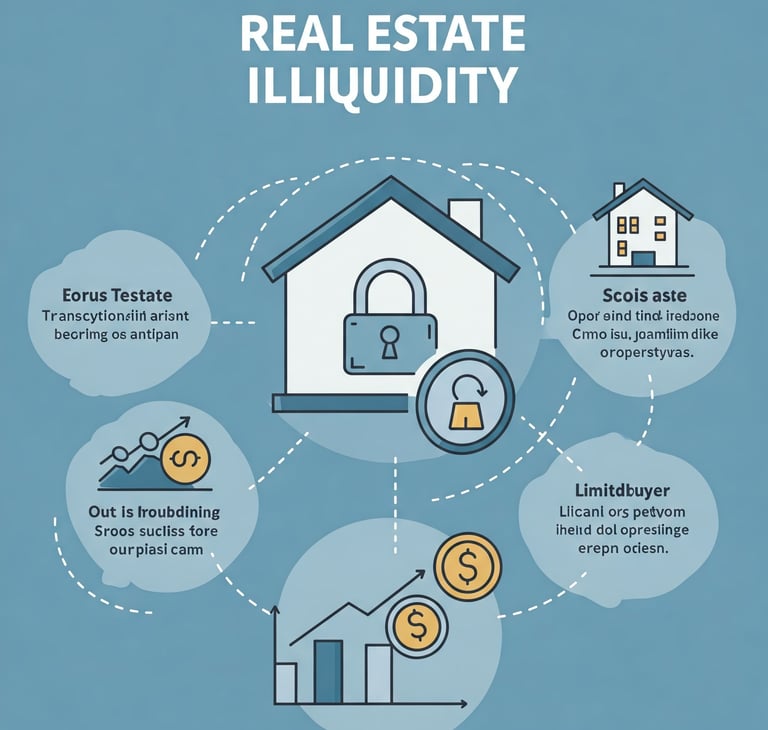

Selling real estate is generally more complex and time-consuming than selling equities or bonds. The process typically involves finding a buyer, negotiating a sale price, and completing extensive legal paperwork, all of which can take several months to finalize. This process can become even more challenging if the property is in a less desirable location or if the market is slow, making it harder to secure a favorable price. Because of these hurdles and the lengthy timeline involved, real estate is considered a long-term investment and is best suited for individuals who do not need immediate access to their funds.
Ways to Invest in Real Estate
Direct Purchase


Directly buying real estate means acquiring properties such as homes, apartments, offices, or land for personal use, rental income, or investment purposes. As the full owner, you have the flexibility to live in the property, rent it out for steady income, or hold onto it to sell later at a profit if its value appreciates. However, this approach requires considerable upfront costs, including maintenance, registration fees, and down payments. To maximize returns, it is essential to thoroughly research the location and study market trends before making a purchase, ensuring the investment aligns with your financial goals and offers strong profit potential.
Real Estate Investment Trusts (REITs)
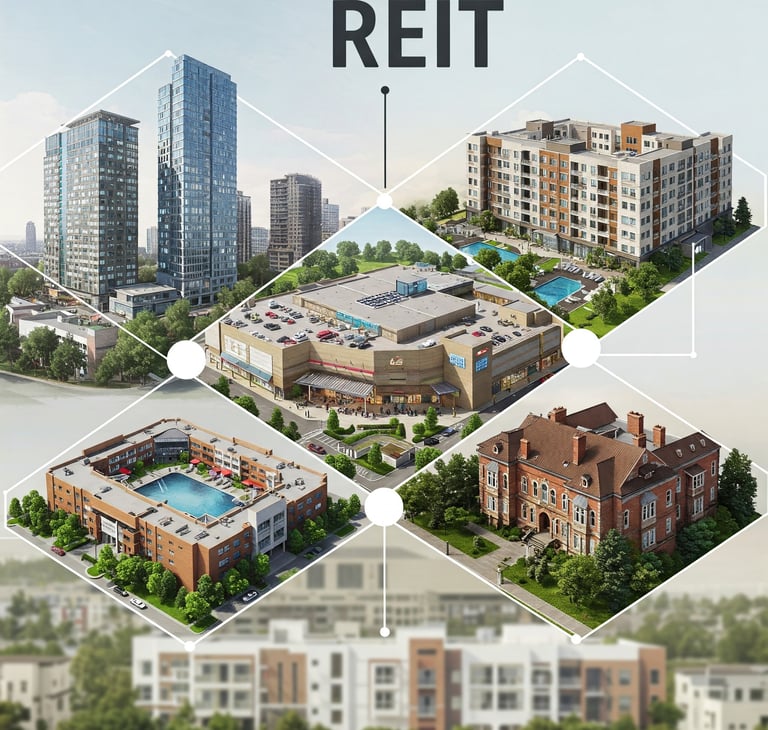

REITs, or Real Estate Investment Trusts, provide a way to invest in large-scale properties such as offices, shopping centers, or apartment complexes without needing to directly own or manage them. These companies pool money from many investors to buy or operate real estate assets, and then share the profits with shareholders. REITs are required to distribute a significant portion of their income, so investors often receive regular payments derived from rental income or property sales. Additionally, because REITs are traded on stock exchanges, you can easily buy or sell shares, offering liquidity and flexibility similar to other publicly traded securities.
Flipping Properties


A real estate flip involves buying a property to sell it quickly for a profit. This usually means purchasing a home that is undervalued or in need of repairs, renovating it to increase its value, and then selling it at a higher price. In some cases, investors may buy properties without making improvements, simply hoping that market conditions will drive up the value in a short period. Successful flipping requires a strong understanding of the local real estate market, negotiation skills, and careful management of renovation costs. However, flipping carries risks such as unexpected repair expenses, slow sales, or sudden market changes. Despite these challenges, flipping can offer substantial returns and often leads to improved properties and noticeable short-term price changes in the market
